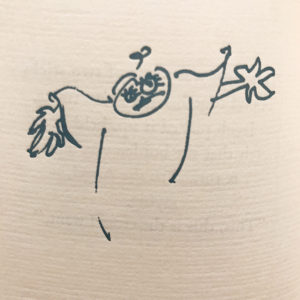We are in the midst of autumn and we come to an angelic period. In three days’ time, on October the 2nd, it’s the Feast of the Guardian Angels, and today, the 29th of September, brings the Feast of St. Michael the Archangel––better known as Michaelmas. The one that comes later is more personal, when we celebrate and honor our personal guardian angels in a tradition going back to the Fourth Century, when folks began setting up altars in their homes on the feast in honor of their angelic protectors.
The one that comes today, Michaelmas (pronounced mick-il-mus), begins with Michael the Archangel but really honors angels in general. Blackberries are part of the custom, but we’ll get to that later. First, let’s consider the universality of angels and how they have made appearances in the folkways of diverse cultures around the globe, which, I think, is pretty fascinating. And so it is fitting to celebrate not just Michael, but all angels. And while Michaelmas is an old holiday that comes out of the Catholic church, various traditions will honor today Michael as well as Gabriel and Raphael. Others will include Uriel, Raguel, Ramiel, and Sariel. I love these names; the further down the roster we go, the more mysterious the names become and we cross a fascinating linguistic bridge to ancient tongues. The “-el” suffix of these angelic names is Sumerian in origin, signifying “brightness” or “shining,” names that in their true form would be Micha-el, Gabri-el, Rapha-el, Uri-el, Ragu-el, Rami-el, Sari-el. The list continues: Camael, Jophiel, and Zadkiel; Anael, Simiel, Oriphiel, and Raguel; Metatron, Israfil, and Malak al-Maut. Their etymology connects to the Akkadian ilu (radiant one), Babylonian ell (shining one), Old Welsch ellu (shining being), Old Irish aillil (shining), Anglo-Saxon aelf (radiant being), and English elf (shining being).
The Feast of the Guardian Angels never did develop traditional foodways, but Michaelmas has. There is roast goose for some and for others, it’s a night to roast nuts. In Scotland, there are Struan Micheil, Michaelmas bannocks, somewhat like a scone but a flatbread, basically, cut into wedges, typically made from equal amounts of oats, barley, and rye, traditionally made without the use of metal: wooden fork, wooden or ceramic bowl, baking stone. The bannocks are served with blackberries or blackberry jam, and here is where we get to the more universal tradition for Michaelmas, one that goes back to one of the great legends of St. Michael the Archangel, for it was Michael who battled Satan, the fallen angel. When Satan fell to Earth, it was in a bramble patch––a blackberry patch––that he landed. Have you ever been in a bramble patch? The brambles are full of thorns. Those juicy, delicious blackberries come at a cost. Legend has it that each year, Satan returns to curse and spit upon the brambles that he landed upon, and who can blame him? I think we might all do the same.
The image above is one of the naive illustrations printed letterpress in the Convivio Bookworks limited edition book The Room of Crosses, in which an angel comes to grant a wish to a discontented farmer. As for blackberries, well, I don’t know that I ever did have a blackberry until I began going to Maine for printing internships when I was in grad school. In Maine, it’s easier to forage for edibles. There were wild blueberries growing beneath the power lines, and just a few yards from the house, close by to the road, wild raspberries and wild blackberries. If you’ve not been in a bramble patch and are wondering why Satan was so infuriated at landing in one, well… I wrote about my experience with blackberries in an essay that was published in 2009 in a magazine called My Table. It’s Houston’s dining magazine. I’m pretty sure it’s ok if I republish it here for you today…. as a Michaelmas gift, if you will.
B L A C K B E R R I E S
The sun is warm, and the blackberries are ripening in Maine. I see them along the roadside each day as I walk past, and today, the call is too alluring. Back home in Florida I’d have to pay three bucks or more for just a half pint tray at Publix, and here, so many wild berries, free for the taking.
Amongst the berries, with my stainless steel colander filling nicely, my mind wanders and I begin to think of blackberry jam, and blackberry pie, and I even wonder about blackberry Jell-O. And I am amazed at how little competition I have. No one else is here. No neighbors, no signs of birds gorging or raccoons foraging. Just branches laden heavy with fruit. And thorns––I notice thorns, though they seem harmless enough.
From the house, I hear a call for lunch. “One minute,” I yell. The colander’s pretty full, but there’s always one more berry I’m after. And there they are, at the deepest edge of the roadside woods: the plumpest berries yet, near bursting with juice. My adrenaline spikes. I make my way carefully through the plants, but still one leg or the other sometimes catches on the brambles. Shorts were probably a bad idea.
The berries are half the size of my thumb and they give gently as I pull and gather them, while the plants, relieved of their heavy burden, spring upwards in the dappled sunlight. I picture myself in a painting by one of the French Impressionists. Surely they painted berry pickers.
There’s a buzzing in my ear, and from the house, another call to lunch, as more plump berries turn up beneath a leafy branch. I lean for them, careful not to spill the contents of the colander, but distraction sets in: My legs are beginning to itch. I look down and notice swarming mosquitoes from the cool woods, the plague of my days in Maine. Torn between swatting and gathering, I attempt to swat one leg with the other as I lean in further for the berries. But as I lean, something tugs at my shirt. It’s the thorns. They’ve got me to where it would be painful to press on or to pull back. I press on. I find the thorns actually have a good enough grip on my shirt that they can support me as I lean in for another handful of berries. But then I lose my footing, slip down a small embankment, while, for better or worse, the thorns still hold their grip, as I cling tightly to the colander.
Finally I do have to pull back. The tugging on my shirt ceases as suddenly as it began as a fierce Velcro sound tears through the sylvan wooded quiet. I tense for a moment, then wonder at the pleasing cool breeze across my left arm. It feels good, but it’s blowing through a new, large gash in my sleeve. The cloth dangles at the elbow, and I realize, too, that my arms and legs are stinging. I make my way out as the bramble patch lays claim to more and more of my clothing and bare skin, and finally stumble out onto the roadside, mosquito-bit and briar-scratched, clutching my colander full of berries.
My neighbor, Mr. Knapp, drives past in his old Ford pickup. He stops, then backs up to where I’m standing. “You all right?” he asks. He is Maine born and bred, a man economical with his words. “I’m ok,” I reply. I manage a nervous smile. Mr. Knapp nods, and the engine sputters as he shifts the truck out of reverse. As he drives off, I think I see him rolling his eyes. I make my way back to the house in the wake of his exhaust. I can taste blood on my lip, and I can almost taste blackberry pie.

